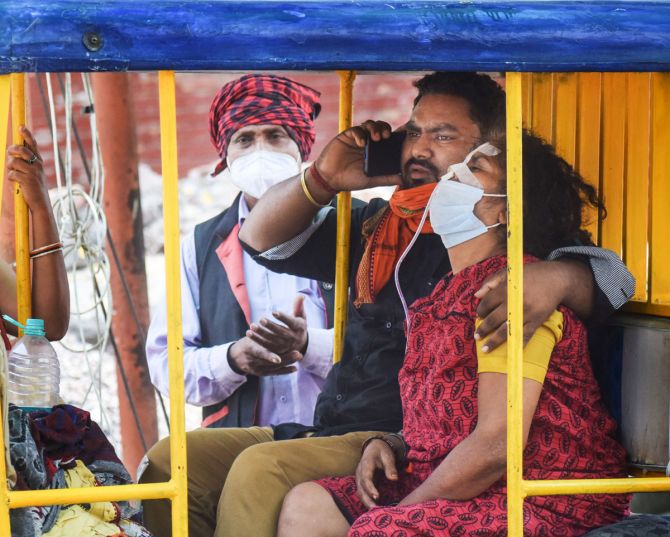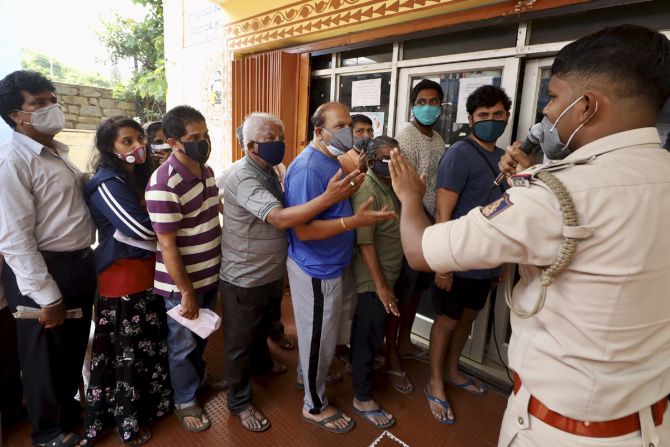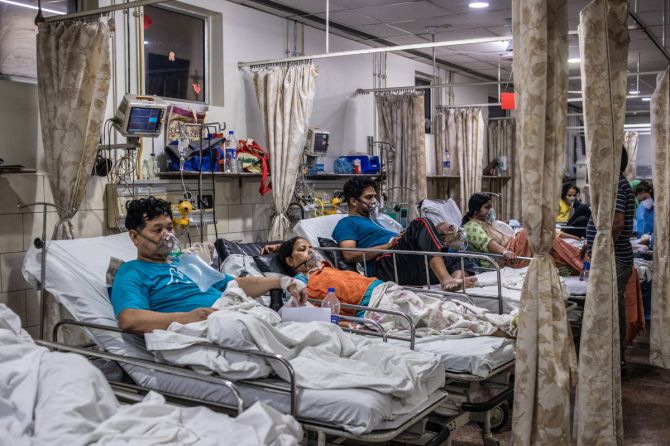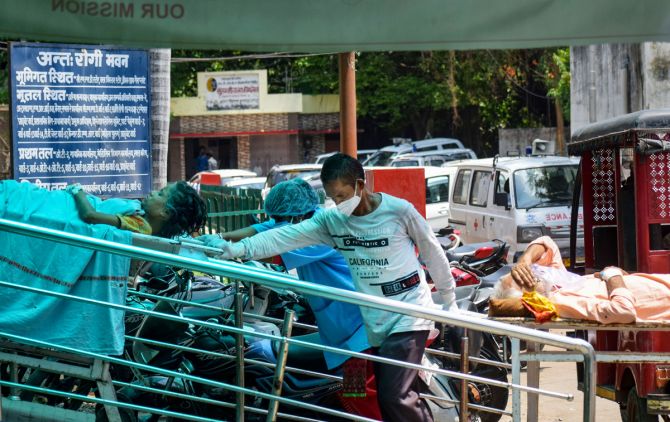'Modi is still immensely popular and, therefore, he can sustain any number of policy failures.'
'Modi himself has worn multiple faces so it would be naive to think that the Modi of 2021 will be the same Modi that will be campaigning for re-election in 2024.'

"We do not know the true impact of COVID on the ground in UP, both because the media has not focused much on it and because the state government is doing what it can to suppress negative coverage."
"If UP is hit hard, the BJP could pay a major price down the line," says Milan Vaishnav, senior fellow and director of the South Asia Program at the Carnegie Endowment for International Peace in Washington DC.
His primary research focus is the political economy of India, and he examines issues such as corruption and governance, state capacity, distributive politics, and electoral behaviour.
A PhD, MA and MPhil in political science from New York's Columbia University, Dr Vaishnav's book When Crime Pays: Money and Muscle in Indian Politics was awarded the Kamaladevi Chattopadhyay New India Foundation book prize in 2017.
He also hosts a weekly podcast Grand Tamasha on the latest developments in India.
One of the most astute political commentators on India, Dr Vaishnav discusses the notable outcomes of the state election results in an e-mail interview with Rediff.com's Archana Masih.
Every election is unique -- what were the top 5 features of these assembly elections?
I think there were two noteworthy features related to the process, and three related to the outcome.
On the process side, first and foremost, campaigning -- especially in West Bengal -- took place amidst a steadily worsening pandemic.
Polls in two constituencies were postponed after two candidates passed away from COVID.
We saw massive crowds gather, without adequate masking or social distancing, as the country was being ravaged by a horrific second wave of the coronavirus.
I think there are going to be many tough questions asked of parties of all stripes and of the Election Commission of India once the dust settles.
The ECI's role was a second notable feature in that many of its actions were mired in controversy, whether it was the decision to schedule a seven-phase election in Bengal (thought to advantage the BJP) or its decision to walk back its ruling that BJP leader Himanta Biswa Sarma be banned from campaigning for 48 hours (later reduced to 24) after he made threatening remarks on the campaign trail.
A number of India's apex institutions have experienced a crisis of credibility of late, and the ECI is certainly among them.
In terms of election outcomes, I would simply point out three features.
First, the BJP laid it all on the line in Bengal and came up short. This was a prestige battle for the party and for the prime minister, Home Minister Amit Shah, and BJP President J P Nadda, in particular.
Many party insiders thought they had it in the bag. But Mamata Banerjee and the Trinamool Congress proved to be worthy opponents, staving off anti-incumbency to convincingly win re-election.
Second, I am struck by the federal nature of the outcome. The Trinamool retained Bengal, the BJP won Assam, the DMK triumphed in Tamil Nadu, the Left held on in Kerala, and the AINRC-led alliance (which includes the BJP) won in Puducherry.
This is a stunning diversity of outcomes and it could motivate a rebalancing of the power dynamic between the Centre and the states in favour of the latter.
Third and finally, notice how little we are talking about the Congress. What is there to say? It was arguably the biggest loser of these polls. It failed to defeat the BJP in Assam, it lost a second consecutive election to the Left Democratic Front in Kerala (a state which regularly alternates between the LDF and the Congress-led UDF), and it was a non-entity in Bengal and a (very distant) junior partner in Tamil Nadu.

Were you surprised by Mamata Banerjee's spectacular victory? What does her victory against such a vociferous BJP onslaught mean for Bengal and the rest of India?
What surprised me is not so much her victory, but the scale of her victory.
In an assembly of 294 seats, the Trinamool won 213 seats. Yes, the BJP went from 3 seats in 2016 to 77 now, but it failed in its ultimate quest to dislodge 'Didi'.
Across the entire eastern seaboard, from Bengal to Tamil Nadu and most places in between, the BJP struggles when it matches up against regional parties with regionalist roots.
In other words, these are not merely caste-based parties like the RJD or BSP that happen to be rooted in a particular state like Bihar or Uttar Pradesh. Instead, these are parties tied to a particular regional, linguistic, and cultural identity or subnationalism.
The BJP's north Indian/Hindu/Hindi image still struggles to break through in this swath of states. But the result also reminds us how important having a strong chief ministerial candidate is.
Like her or hate her, Mamata is a fierce competitor and a mass leader. This makes it much harder for the BJP to deploy the 'Modi magic' in service of a state election.
Of course, it can work and it has worked. But much depends on the identity of the opponent. It failed spectacularly in Delhi as well where the BJP had no face to counter (Aaam Aadmi Party leader Arvind) Kejriwal.
Does it mean that there is a weakening of the Hindu polarisation playbook that the BJP has used to get votes in the past? Or is it a naive assumption to believe that the strategy of religious polarisation can been defeated?
I don't think we can say there is a 'weakening' or 'defeat' of the polarisation strategy. After all, polarisation worked quite well for the BJP in Assam and one could say the Mamata benefitted from a polarisation strategy in Bengal by ensuring that the Muslim vote consolidated behind her.
So I think we need to move away from these binaries and allow for more nuance. I think we can conclude that there are limits on a polarisation strategy or at the very least unanticipated impacts that could come back to bite you.
Polariation is typically a strategy that is used in conjunction with other factors, be it development, welfare, or the projection of a strong leader.
The strategy of polarisation is going nowhere fast; we will continue to see it in the run-up to 2024 and beyond. But I think we must recognise that we don't have a well-formed theory of when and why it works and when and why it does not.

You wrote in your Washington Post column that despite the mishandling of Covid crisis, Modi is the master of reinvention and will most likely brandish a new face in 2024.
Will the presence of strong chief ministers in Bengal, Kerala, Tamil Nadu along with Rajasthan, Chhattisgarh, Punjab etc be a constant challenge and competition to Modi hereon?
Well, there is always a tussle between the Centre and the states, especially those led by strong personalities. This was true before these elections and it will be true after them.
I agree that the success of the Trinamool in Bengal, the LDF in Kerala, and DMK in Tamil Nadu certainly will ensure that the Centre will have a harder time steamrolling the states.
But, structurally speaking, there is no question the balance of power tilts toward the Centre as a general proposition.
We have seen, for instance, how the Centre has concentrated power under Modi. The Centre has unilaterally remade states, in the case of Jammu and Kashmir and Delhi. It has legislated on policy domains thought to be under the control of the states, like agriculture. It has increased cesses and other central taxes in ways that help to undermine the spirit, if not the letter, of the 14th Finance Commission's recommendations for the devolution of funds.
These changes are significant and will not easily be reversed.
What lessons do these results have for the BJP?
First, the projection of a strong chief ministerial candidate is important, especially when going head-to-head with a party with a strong face.
Second, money and technology are imperfect substitutes for grassroots party organisation.
Third, there are costs to throwing 'everything but a kitchen sink' at an election. In this case, I think it is perfectly valid to ask whether and how the Centre's COVID response was hampered by the party's singular focus on elections.
This could end up being a political liability. After all, politics is not only about winning power, it is what you do once you win power.
What lessons do they have for the Congress? Is the party even in the reckoning now -- considering how their alliance did not win a single seat in Bengal and did not fare well in Kerala, a state Rahul Gandhi is MP from and which won the maximum seats for the Congress in 2019.
I think the lesson for the Congress is that it is going to have to get used to taking a backseat because its already diminished credibility has been diminished even further.
These results provide fresh momentum for the creation of a 'United Front' of opposition parties, but one in which the Congress is a central player though not necessarily the pole around which the coalition is organised.
I think the hand of the so-called 'G-23' group of Congress dissenters is going to be strengthened and they could be work hand-in-hand with other regional leaders to try and corral the Congress in some way to revive the idea of more constructive, more purposive opposition coordination.
How will the Bengal result impact the UP election next year? Did the BJP's handling of the Covid crisis result in its poor show in Bengal?
I think, generally speaking, the Centre's misgovernance with regards to COVID is a political liability. There is modest evidence that it hurt the BJP in the final stages of the Bengal campaign.
It is hard to assess because the constituencies in the final phases of the election were pro-Trinamool areas to begin with.
In terms of UP, I think this raises the stakes of UP even further because now the BJP is on the defensive, having lost a major prestige battle in Bengal.
It would not want to repeat this in UP in 2022, the biggest election prize short of a Lok Sabha election.
What we do not know, however, is the true impact of COVID on the ground in UP, both because the media has not focused much on it and because the state government is doing what it can to suppress negative coverage.
If UP is hit hard, the BJP could pay a major price down the line.

How will the BJP's response to COVID-19 affect the UP election and Modi's future?
This is what I tried to address in my recent Washington Post column. There are some election analysts already saying this is the beginning of the end for Modi. That COVID will be his 'Waterloo'.
I think one should not underestimate the strength of his popularity and connect with the so-called aam aadmi.
Modi is still immensely popular and, therefore, he can sustain any number of policy failures. The way I see it, people like Modi first and then find ways to justify that sentiment second.
Additionally, there is the question of alternatives; right now, there is no Opposition leader who has Modi's combination of charisma, character, and credibility with the Indian voter.
Voters make relative assessments, not absolute ones.
Third, the BJP has proven so adept at changing the narrative -- from demonetisation in 2016 to Balakot/Pulwama in 2019. Modi himself has worn multiple faces so it would be naive to think that the Modi of 2021 will be the same Modi that will be campaigning for re-election in 2024.
Feature Presentation: Aslam Hunani/Rediff.com











 © 2025
© 2025